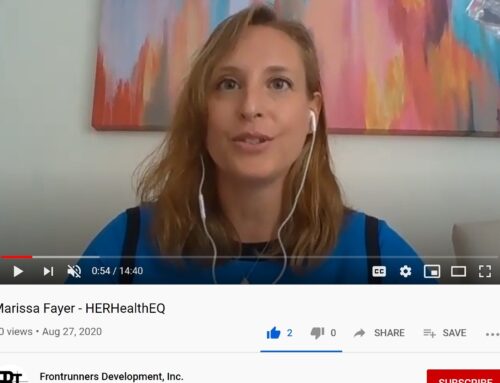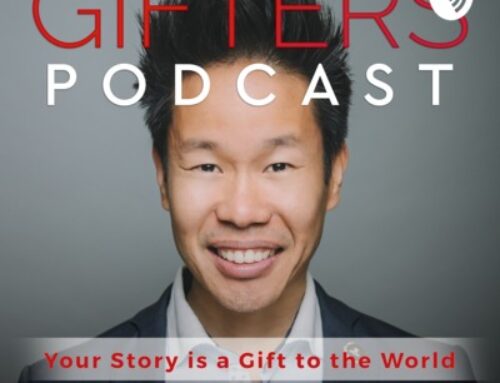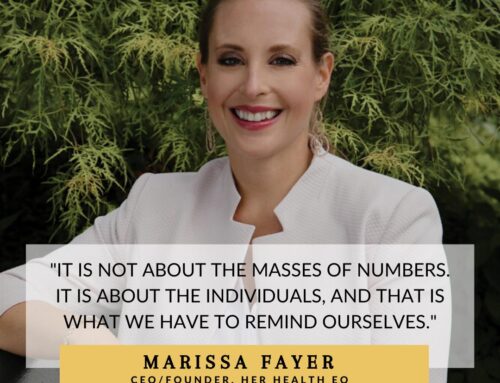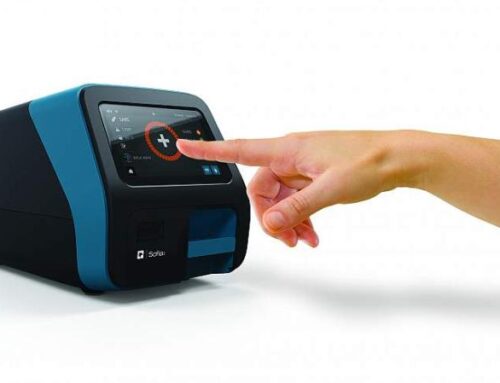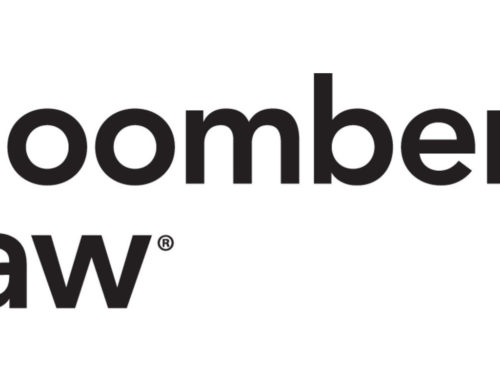“Women around the world are all the same. They are going to take care of their children and their community and often die doing so”, says Marissa Fayer, CEO of HERHealthEQ.
Honored to have “sat down” with Lucy Orr-Ewing to be interviewed for this amazing article she wrote.

One of the joys of lockdown is that I’ve managed to get hold of some incredible women all around the world that I would never have got to otherwise, one of whom is Marissa Fayer. Marissa is the Founder and CEO of HERHealthEQ, a not-for-profit that provides medical devices and equipment for women’s health issues to developing nations. COVID has, for some, been nicknamed ‘The Great Pause’, but Marissa has kept relentlessly busy running her own consulting and advisory firm in the life-sciences and medical device space as well as raising investment for HERHealthEQ. Last year was a seminal one, comprising 147 flights over 6 continents and culminating in a TEDx Talk in Lugano, so Marissa says she’s at least glad to spend some rare time in her New York apartment.
From said apartment, Marissa took me through the impetus for founding HERHealthEQ, how to make sure a non-profit adds maximum value by utilising the resources on the ground effectively and being clear in its criteria, and how women are inherently the same across the world, but the approach to women’s health is not.
After falling into the medical device industry, and working for 20 years as a manufacturing engineer and executive, Marissa founded HERHealthEQ “by accident”. The idea came about while living in Costa Rica when she learned that in an Eastern part of the country, there was a disproportionately high mortality rate for breast cancer compared with the rest. Marissa soon discovered that the only mammography equipment in that region had been broken down for years. Together with the Costa Rican government, the US embassy, a local NGO and hospital, Marissa was able to install a repurposed mammography machine that was sitting unused in storage. Several years later, the mortality rate is 10 times lower than it was. Marissa tells me this life-saving piece of equipment “is so often thrown away to just make room in a warehouse”.
“$765 billion of medical equipment has been deemed waste in the US in the last 3 years alone. If even 10% of that equipment was repurposed, 40 million lives could be saved.” – Marissa Fayer
The basis for HERHealthEQ is that when a new design of an ultrasound or mammogram is installed in developed countries, this renders the old version useless regardless of whether it is operational. “The result”, Marissa says, “is that $765 billion of medical equipment has been deemed waste in the US in the last 3 years alone. If even 10% of that equipment was repurposed, 40 million lives could be saved.”

What really interests me about Marissa’s work is how she distributes the aid. Not-for-profits and charity donations are sometimes criticised for the ‘dump and run’ approach, or seen to glorify what Afua Hirsch calls “poverty porn”. Marissa resolutely avoids these pitfalls: “traditional non-profits are really ineffective; I don’t want to put a team on the ground in any country. I’d rather utilise partners who already have those teams and leverage their networks and mine for the outcome we want to achieve”. This approach to partnership means that they don’t waste time developing teams or resources that already exist in the community, and, crucially, both parties are contributing to the solution.
Marissa’s bridging of the world of non-profit and for-profit allows her to identify technology and equipment with her clients that she can use with HERHealthEQ. It also means that she can approach non-profit with all the tried-and-tested techniques of corporates, namely clear accountability, reporting and collaborative working. Marissa can properly match excess medical equipment to the need in developing countries, and does not exacerbate the distressing reality that “70% of all donated medical equipment ends up in landfill”.
Marissa’s TEDx Talk on how to be successful in making a significant impact succinctly covers these key ingredients:
- Community ownership and matching with partners on the ground.
- Committed organisations to partner with local entities to service the equipment that are supported by multi-year service contracts.
- Accountability systemsto ensure clear reporting to investors, supporters and donors, as you would in a for-profit transaction.
Marissa doesn’t patronise doctors by telling these doctors how to help their patients: “The doctors in these underdeveloped countries are just as good, they’re just as well trained, and even US-educated half of the time. They’re doing what they can to help their patients but just need the tools to do their job”. Instead she recognises that the unique value she brings is in her network, her board, and her knowledge of the medical device industry.

Focus and a clear criteria are key for a successful non-profit. Marissa is intent on women’s health specifically because a woman is the epicentre of the community, especially in developing countries where over 90% of a woman’s income goes back into supporting their family (compared to 40% of men’s). Implementing just one piece of equipment to save a woman’s life will enable her to “care for her loved ones, and send her children to school, to make a living for herself, and pull her and her family out of poverty.”
Marissa is also clear that HERHealthEQ only deal with non-communicable diseases such as cancer, heart disease and diabetes, as communicable diseases (e.g. HIV, malaria, TB) typically receive much more funding and attention. “Cancer is the space I know and is a huge problem in 2nd world countries, and that’s where equipment can help. Our stance is that if people have their health, they can fight off communicable diseases (most of the time) much more effectively.” Marissa tells me that in 2018, 22 million women in developing countries died from non-communicable, treatable diseases. To put that into context, in Switzerland, 104 women died from Cervical Cancer in 2018. In Rwanda, a country of a similar size, 310,000 died of the same disease. This unsettling reality is tangible proof of just how urgently developing countries need equipment that is currently lying in landfill or gathering dust in warehouses.
HERHealthEQ’s mission is clear: to focus on projects with existing or potential partners that will deliver value now. This means that they work with 2nd rather than 3rd world countries, because, Marissa says, 80% of a country’s foreign aid leaves when they’re advanced from 3rd to 2nd world, which especially impacts their healthcare system. Marissa doesn’t set out to save all the world’s problems; but this is the very reason for her success.
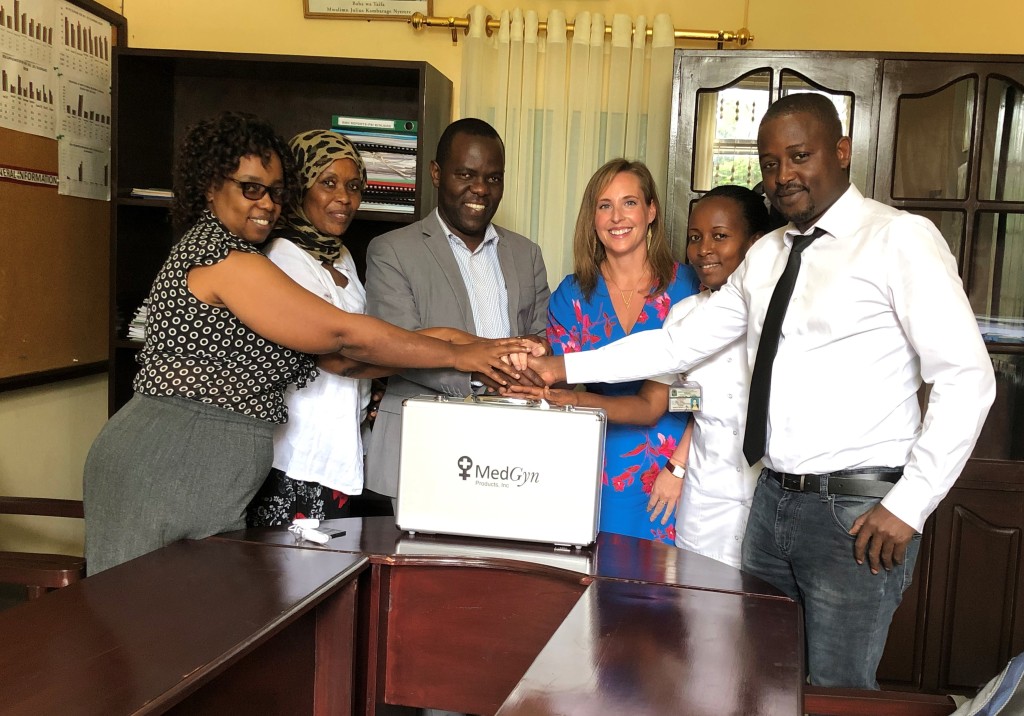
We got onto the topic of FemTech, a field which Marissa says is “almost offensive” to be associated with. Developing countries do not focus on the same problems as developed countries in terms of fertility, menopause and menstruation. Difficulties with becoming pregnant are less critical, and to have access to a tampon is a luxury, let alone CBD-infused, ergonomic, organic cotton tampons. “FemTech in the vast majority solves first-world problems and is non-applicable right now for the rest of the world. It’s all so incremental, I can’t find anything that’s really life-saving in the FemTech space”.
Marissa criticises the way “FemTech is all about one organ: menopause, ovulation and pregnancy” when she rightly asserts: “women’s health is so much more than one organ”. Accordingly, HERHealthEQ looks into women’s more complicated anatomy and what impact it has on their health and reaction to products. Women have more glands, hormones and internal interactions and so present differently with heart attacks, strokes and lung cancer to men. They also have 12 gender-unique spots for cancer, as opposed to men’s 2. Lung and stomach cancer is particularly prevalent in women in developing countries because they cook over kerosene or charcoal stoves inside, which is highly carcinogenic. HERHealthEQ seeks to stabilise the inequalities in health and health data, and addresses the whole woman, rather than just the womb.
“FemTech is all about one organ: menopause, ovulation and pregnancy. Women’s health is so much more than one organ.” – Marissa Fayer
Speaking to Marissa gave me some much-needed perspective on women’s health and different countries’ approach to diagnosis and treatment of these issues. Though her work spans different worlds, cultures, healthcare systems and infrastructures, she says that “women are all the same. They are going to take care of their children and their community and often die doing so”. A woman’s health is often her lowest priority and even if she does get tested, the healthcare systems often have no way to treat them which renders check-ups a pointless endeavour.
HERHealthEQ is therefore doing critical work to provide equipment but also proof that treating diseases early can save lives. In providing the resources to overcome the emotional and infrastructural barriers to health equity, Marissa’s work addresses the systemic issues within women’s health that feel more important than ever.
Article linked here.

